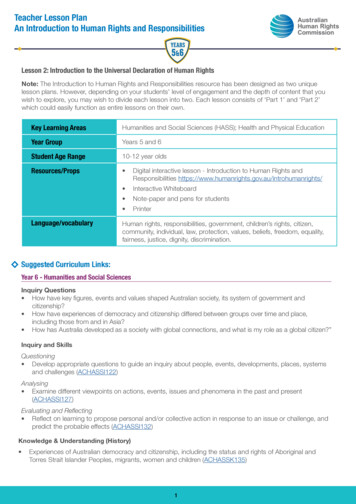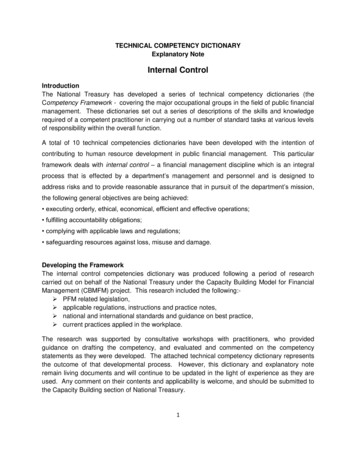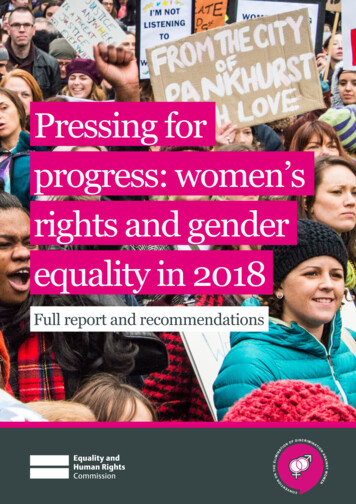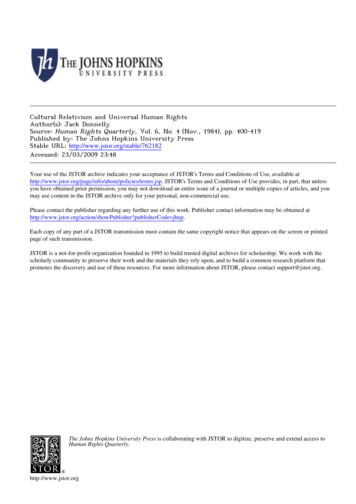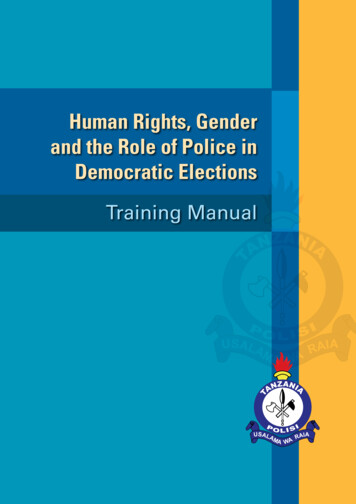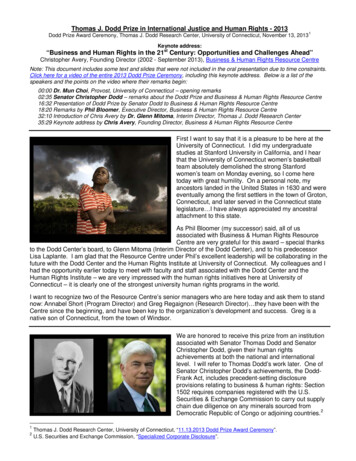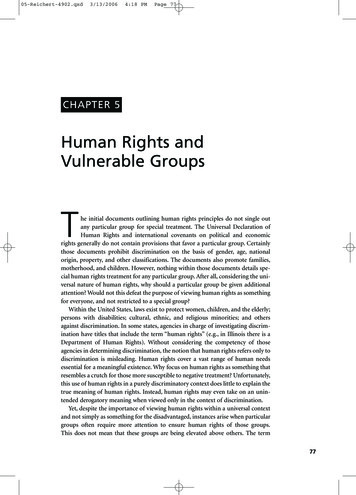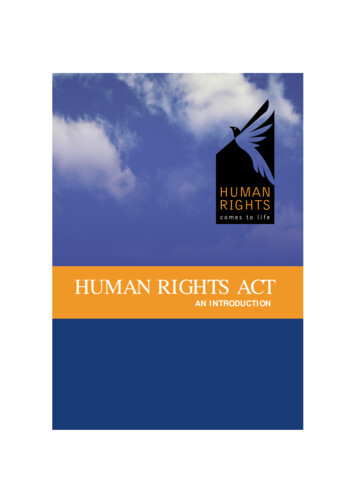
Transcription
HUMAN RIGHTS ACTAN INTRODUCTION
PREFACEHundreds of laws have been passed affecting everyaspect of our lives. Sometimes it can be difficult toknow what our basic rights really are. Fifty years agoBritain helped to enshrine our basic liberties into theEuropean Convention on Human Rights. But we couldonly claim them by taking the long road to Strasbourg.The Human Rights Act means that we can safeguardour rights here in the UK. And we can all be clearerabout the basic values and standards we share. Thisleaflet introduces the Human Rights Act and says howit works. UK Governments have respected theEuropean Convention for some 50 years. So you‘llprobably never need the Act. But if your rights ever areinfringed, it‘s good to know there’s something you cando about it.JACK STRAWLORD IRVINE OF LAIRG
WHAT IS THE HUMAN RIGHTS ACT?The Human Rights Act 1998 is a new law in full forcefrom 2 October 2000. It gives further effect in the UKto the fundamental rights and freedoms in theEuropean Convention on Human Rights (ECHR).WHAT DOES IT DO?The new law does three simple things:It makes it unlawful for a public authority, like agovernment department, local authority or the police,to breach the Convention rights, unless an Act ofParliament meant it couldn‘t have acted differently It means that cases can be dealt with in a UK courtor tribunal. Until now, anyone who felt that their rightsunder the Convention had been breached had to go tothe European Court of Human Rights in Strasbourg It says that all UK legislation must be given ameaning that fits with the Convention rights, if that’spossible. If a court says that‘s not possible it will be upto Parliament to decide what to do 1
WHAT IS THE EUROPEAN CONVENTIONON HUMAN RIGHTS?This is one of the earliest and most important treatiespassed by the Council of Europe, a group of nationsinvited by Sir Winston Churchill to come together afterthe Second World War to stop such atrocities and actsof cruelty happening again.The Council of Europe is quite separate from theEuropean Union (EU). It has its own Court of HumanRights in Strasbourg. You are already able to go to theStrasbourg court to claim your rights under the ECHR.However the ECHR has until now not been part of theUK’s domestic law. So our courts have not normallybeen able to deal with claims.2
YOUR CONVENTION RIGHTSThere are sixteen basic rights in the Human Rights Act,all taken from the European Convention on HumanRights. They don‘t only affect matters of life and deathlike freedom from torture and killing; they also affectyour rights in everyday life: what you can say and do,your beliefs, your right to a fair trial and many othersimilar basic entitlements.(Article 1 is introductory)ARTICLE 2 RIGHT TO LIFEYou have the absolute right to have your life protectedby law. There are only certain very limitedcircumstances where it is acceptable for the State totake away someone‘s life, eg if a police officer actsjustifiably in self defence.ARTICLE 3 PROHIBITION OF TORTUREYou have the absolute right not to be tortured orsubjected to treatment or punishment which isinhuman or degrading.ARTICLE 4 PROHIBITION OF SLAVERY AND FORCED LABOURYou have the absolute right not to be treated as aslave or forced to perform certain kinds of labour.3
ARTICLE5 RIGHT TO LIBERTY AND SECURITYYou have the right not to be deprived of your liberty- ’arrested or detained‘ - except in limited casesspecified in the Article (eg where you are suspected orconvicted of committing a crime) and where this isjustified by a clear legal procedure.ARTICLE6 RIGHT TO A FAIR TRIALYou have the right to a fair and public hearing within areasonable period of time. This applies to both criminalcharges against you, or in sorting out cases concerningyour civil rights and obligations. Hearings must be byan independent and impartial tribunal established bylaw. It is possible to exclude the public from thehearing (though not the judgement) if that is necessaryto protect things like national security or public order.If it is a criminal charge you are presumed innocentuntil proved guilty according to law and have certainguaranteed rights to defend yourself.ARTICLE7 NO PUNISHMENT WITHOUT LAWYou normally have the right not to be found guilty ofan offence arising out of actions which at the time youcommitted them were not criminal. You are alsoprotected against later increases in the possiblesentence for an offence.4
The rights in Articles 8 to 11 may be limited wherethat is necessary to achieve an important objective.The precise objectives in each Article which allowlimitations vary, but they include things like protectingpublic health or safety, preventing crime, andprotecting the rights of others.ARTICLE 8 RIGHT TO RESPECT FOR PRIVATE ANDFAMILY LIFEYou have the right to respect for your private andfamily life, your home and your correspondence. Thisright can only be restricted in specified circumstances.ARTICLE 9 FREEDOM OF THOUGHT, CONSCIENCEAND RELIGIONYou are free to hold a broad range of views, beliefsand thoughts, as well as religious faith. Limitations arepermitted only in specified circumstances.ARTICLE 10 FREEDOM OF EXPRESSIONYou have the right to hold opinions and express yourviews on your own or in a group. This applies even ifthey are unpopular or disturbing. This right can only berestricted in specified circumstances.5
ARTICLE 11 FREEDOM OF ASSEMBLY AND ASSOCIATIONYou have the right to assemble with other people in apeaceful way. You also have the right to associate withother people, which can include the right to form atrade union. These rights may be restricted only inspecified circumstances.ARTICLE 12 RIGHT TO MARRYMen and women have the right to marry and start afamily. The national law will still govern how and atwhat age this can take place.(Article 13 is not included in the Human Rights Act)ARTICLE14 PROHIBITION OF DISCRIMINATIONIn the application of the Convention rights, you havethe right not to be treated differently because of yourrace, religion, sex, political views or any other status,unless this can be justified objectively. Everyone musthave equal access to Convention rights, whatevertheir status.6
ARTICLE 1 OF PROTOCOL 1 PROTECTION OF PROPERTY(a ’protocol‘ is a later addition to the Convention)You have the right to the peaceful enjoyment of yourpossessions. Public authorities cannot usually interferewith things you own or the way you use them exceptin specified limited circumstances.ARTICLE 2 OF PROTOCOL 1 RIGHT TO EDUCATIONYou have the right not to be denied access to theeducational system.ARTICLE 3 OF PROTOCOL 1 RIGHT TO FREE ELECTIONSElections for members of the legislative body (egParliament) must be free and fair and take place bysecret ballot. Some qualifications may be imposed onthose that are eligible to vote (eg a minimum age).ARTICLE 1 OF PROTOCOL 6 / ARTICLE 2 OF PROTOCOL 6ABOLITION OF THE DEATH PENALTYThese provisions abolish the death penalty. There canbe limited exceptions in times of war but only inaccordance with clearly specified laws.7
HOW DOES THE HUMAN RIGHTS ACT AFFECT ME? DOES THE HUMAN RIGHTS ACT CHANGEMY RIGHTS?No. But the Human Rights Act makes claiming yourrights much quicker and easier. Instead of having togo to Strasbourg, you can now bring a case in a courtin the UK. DOES THE HUMAN RIGHTS ACT AFFECT THE WAYGOVERNMENT AND PUBLIC BODIES BEHAVE?Yes. The Human Rights Act says that all publicauthorities must pay proper attention to your rightswhen they are making decisions that affect you. Publicauthorities include Government Ministers, civilservants, your local authority or health authority, andalso agencies like the police, the courts and privatecompanies when carrying out public functions.That‘s nothing new – respecting rights and balancingrights and responsibilities has always been animportant part of public service in this country. But theHuman Rights Act makes sure that those in authorityover you will have to check that they do not rideroughshod over your rights, even when they believethey are doing so for a good reason. They will have tobe careful about the balance they are striking andthink hard about how they can cause the least possibleharm to individuals.8
People who work for public authorities have beentrained in the new law. And every time Governmentproposes a new law in Parliament it has to make astatement under the Human Rights Act about how thenew law fits in with the Convention rights. CAN I USE THE HUMAN RIGHTS ACT AGAINSTANOTHER PRIVATE INDIVIDUAL WHO INFRINGESMY RIGHTS?Not directly. You cannot sue, or be sued by, anotherindividual for breaking the Convention rights. But youmay benefit indirectly because the Human Rights Actmeans all laws have to be given a meaning and effectwhich is as close as possible to the Convention rights.It‘s also a lot easier to insist on your rights if they arewritten down. You can point them out to the personwho you think is ignoring them. BUT WHAT ABOUT RESPONSIBILITIES? ARE MYRIGHTS UNDER THE ACT UNLIMITED?They are not. Most of the rights in the Human RightsAct have some boundaries to prevent them unfairlyaffecting the rights of others - or overriding the rightsof the wider community. In a democratic societyeveryone has rights. Your rights come first, but so doeveryone else‘s. So we all have to accept some limitson our rights in order to make sure others aretreated fairly.9
For example, someone‘s right to liberty might have tobe restricted if they have committed a crime. Freedomof speech cannot mean the freedom to shout ’Fire!‘ ina crowded hall, when there isn‘t one. WILL THE HUMAN RIGHTS ACT REALLY CHANGEANYTHING?It should do. This is a type of higher law, affecting allother laws. The rights and their limitations are really aset of basic values. Respect for the rights andeverything that goes with them should help changethe way people think and behave and create anatmosphere in which decisions and policies arediscussed and understood. How far the Human RightsAct will improve the quality of life for all in the UKdepends on how far we all respect the values itenshrines. WHAT DOES THE HUMAN RIGHTS ACT MEANFOR DEMOCRACY?Democracy is the only form of government which fitswith the Convention rights. Tolerance and broadmindedness are the bedrock of democracy - and thebedrock of the Convention rights. The Human RightsAct recognises the central place of Parliament in ourdemocracy. It should encourage transparency andopenness in Government because public authoritieswill use the language of the Convention rights to10
debate problems. Because that‘s a language we canall understand we will be better able to understandwhat‘s being said - and to join in. WILL THE HUMAN RIGHTS ACT PLEASE EVERYONE?Not all the time. There is bound to be argument oversome decisions and clashes between rights. We won‘tall agree on subjects like measures about privacy,victims‘ rights or freedom of expression. The HumanRights Act may affect decisions on these things. Somepeople are bound to feel that the wrong answer isreached. But the Human Rights Act should ensureproper debate and that basic rights are respected in abalanced way. WHAT DOES THE HUMAN RIGHTS ACT MEAN FOROUR COURTS AND JUDGES?The Human Rights Act will help them protectindividuals‘ Convention rights. And they will be able tocheck that the rights of the wider community areproperly balanced. If individuals‘ rights have to beaffected, the public authority will need to show that itis not using a sledgehammer to crack a nut. This isoften referred to as ’proportionality‘: interfering withrights only so far as it is necessary in order to achieve aspecific purpose set out in the Convention.For example, there is a fundamental right to assembly and a right to meet with others.11
So if the police or public authorities are thinking ofbanning certain demonstrations or restricting marchesto certain routes, they must not just impose a blanketban. They must think carefully about what isproportionate so they don‘t go any further thannecessary to guard against the risks to others whichthey reasonably anticipate. Every court in the land hasbeen trained to help you when a public authority isacting against your rights. SO WILL THE COURTS BE ABLE TO OVERRULEPARLIAMENT?No. The Human Rights Act specifically says judgescan’t overrule Parliament. But the courts will be able todevelop the law in line with the Convention rights.Judges have always been able to develop the lawthemselves. But the Human Rights Act means they willoperate within a democratic code of values, based onyour Convention rights. DOES THE HUMAN RIGHTS ACT MEAN MORECOURT CASES?Not in the long run. Going to court is always a lastresort. The Human Rights Act will help clarify rightsand public authorities will soon understand how thecourts are likely to interpret the law. In the early dayspeople may try to use the new law to find out justhow the balance will be struck between their rights12
and other people‘s rights. But judges have alreadymade it clear that they will not want to waste time onarguments that have no merit.For example, one of our fundamental rights is to marryif we are of marriageable age. In the UK the law setsthis at 16. It would almost certainly be regarded as atime-waster to go to court to argue that you should beallowed to marry at a younger age. This is the sort ofdecision that every country is allowed to take for itself. WHAT ABOUT SCOTLAND, WALES ANDNORTHERN IRELAND?The Parliament in Westminster has power to pass anylaws, no matter what the Convention says. TheAssemblies in Wales and Northern Ireland and theParliament in Scotland do not have this power. If theypass laws which don‘t fit with the Convention rightsthe courts will overrule them.
HOW CAN I FIND OUT MORE?For more information about the Human Rights Act visit:www.humanrights.gov.ukOr write to: Human Rights Unit Helpdesk, Home Office,50 Queen Anne‘s Gate, London SW1H 9AT.In Northern Ireland write to: The Human Rights Directorate,Office of the First Minister and Deputy First Minister, CastleBuildings, Stormont, BelfastBT4 3SG.In Scotland write to: Scottish Justice Department, SaughtonHouse, Broomhouse Drive, EdinburghEH11 3XD.In Wales write to: ’Human Rights‘, PEP Division, NationalAssembly for Wales, Crown Buildings, Cathays Park, CardiffCF10 3NQ.A more detailed guide to the Human Rights Act, called theStudy Guide, is available in the English and Welshlanguages.Call 0845 600 1151 or Minicom 0845 600 0347 for a free copy.If you would like a copy of this leaflet on audio cassette or inBraille, or any of the languages listed below, please, please call0845 600 1151 or Minicom 0845 600 0347.This leaflet is available in the following languages:Arabic, Bengali, Chinese, English, Greek, Gujarati, Hindi,Punjabi, Somali, Turkish, Urdu, Vietnamese, Welsh.HRG1 . 10/2000 . Crown Copyright . Published by Home Office Communication Directorate
Human Rights Act makes sure that those in authority over you will have to check that they do not ride roughshod over your rights, even when they believe they are doing so for a good reason. They will have to be careful about the balance they are striking and think hard about how they can cause the least possible harm to individuals. 8. People who work for public authorities have been trained .


